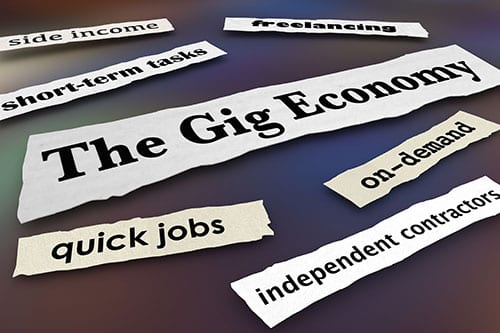Get Ready for Gig Economy Tax Changes
The recent presidential election has increased awareness of possible upcoming changes in the tax system for both business and personal tax returns. However, there have been discussions in the government and the IRS for several years about the dramatic growth of the gig economy and possible changes in the way taxes are levied and reported by this growing army of remote workers, freelancers, or independent contractors.
Whether your business is a freelancing or independent contracting structure, or you own a business that is using these gig workers, ongoing discussions in government taxation entities are looking at changes that will impact you. Unfortunately, changes in tax regulations and procedures rarely mean lower taxes or costs for either the gig worker or the business that hires them. Fair warning comes from the title of a report from the U.S. Treasury Department: “Expansion of the Gig Economy Warrants Focus on Improving Self-Employment Tax Compliancei”
If the title is not scary enough, here is a quote from the report: “For TYs 2012 through 2015, the IRS did not work cases involving approximately $12 billion of payments reported on Forms 1099-K by the nine gig economy companies, but the gig economy workers had potentially not reported these payments on their tax returns. As the gig economy grows and there is less reliance on traditional employer tax withholding responsibilities, a strategic and effective plan to address tax compliance in this sector is essential to keep the IRS from falling even further behind.”
Here are some of the key findings from that 58-page report as posted by TaxFoundation.orgii:
- Reduced self-employment barriers – mostly due to advances in technology and the ability to connect employers, workers, and customers via online applications, it has become quite easy for those previously employed to spin off and work for themselves. From customer service to management and data services, more workers are becoming self-employed than ever before.
- Inexperience in business tax liabilities – these workers have previously relied upon employer withholding and payment of payroll taxes. They were not involved other than seeing the deductions on their payroll records and in many cases getting a refund at the end of the tax year. Now they must take over the role of employer, and one survey found that 34% of gig economy workers did not even know that they may be required to make quarterly tax payments.
- Lower threshold for reporting payments – many gig economy platforms have inadequate requirements for reporting of payments to gig workers. This results in higher failures to report income. Lowering the threshold for reporting requirements is expected to increase the earnings reported by workers.
- Improper expense deduction practices – it is assumed that many gig workers lack the expertise and processes to properly determine allowed expense deductions, track them, and report them to reduce income. This results in unintentional overpayment of income and self-employment taxes.
As a summarization of these takeaways, the discussions cover improving the federal tax system for gig economy work to include:
- Providing simplified expense deduction reporting.
- Lowering reporting thresholds.
- Allowing gig economy platforms to voluntarily withhold income and self-employment taxes for gig workers.
Note that everything you read here is about increasing costs for business and higher tax receipts from workers.
i Expansion of the Gig Economy Warrants Focus on Improving Self-Employment Tax Compliance, U.S. Treasury Department
ii Improving the Federal Tax System for Gig Economy Participants, TaxFoundation.org

